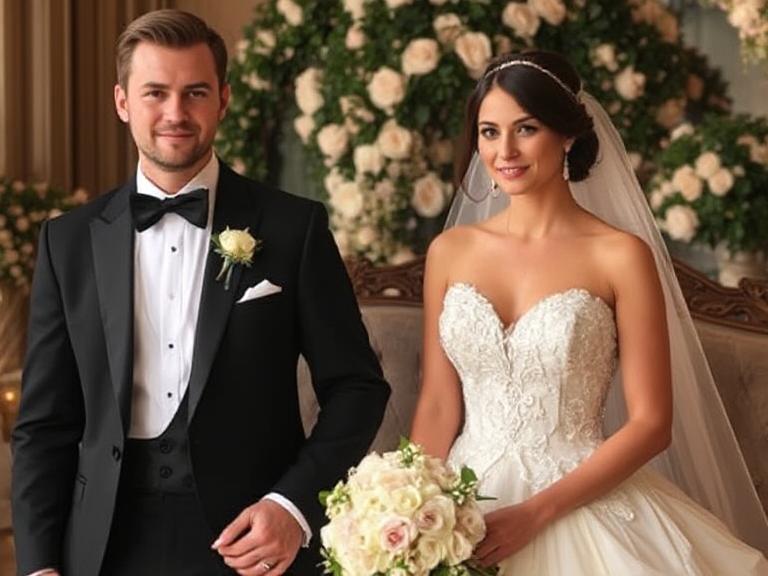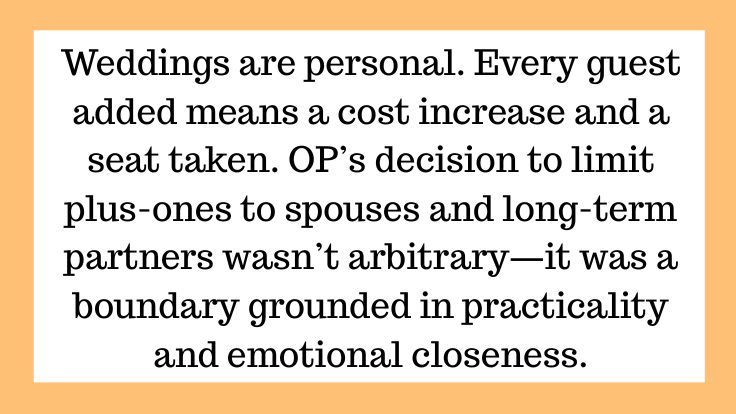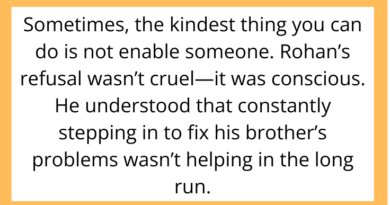Am I the Jerk for Not Giving My Brother and His Fiancée a Plus-One to My Wedding?
Weddings are joyful occasions, but planning them often comes with drama—especially when it comes to the guest list. One common conflict? Who gets a plus-one, and who doesn’t. What happens when saying “no” to a plus-one triggers a family rift?
In this AITAH scenario, a bride finds herself at the center of a family feud simply because she chose not to give her brother’s fiancée—who she barely knows—a plus-one invitation. The question is: was it a matter of fairness or an overstep in boundaries?
The Conflict: A Wedding Invitation Sparks Unexpected Tension

OP (Original Poster), a bride-to-be, is finalizing her wedding guest list. She and her fiancé have decided to keep the ceremony small, intimate, and personal. Due to venue limitations and budget concerns, only close friends and immediate family are being invited. They also set a clear rule: only married or long-term partners (over one year) get a plus-one.
Her younger brother, who has been dating his fiancée for just under six months, receives an invitation—without a plus-one. He responds by calling OP and expressing his disappointment, claiming she’s being disrespectful to his relationship and treating his partner like an outsider. When OP stands firm on her rule, he accuses her of playing favorites and says he may not attend the wedding at all.
Their parents get involved, urging OP to make an exception “for the sake of peace.” But OP refuses, saying she won’t compromise her boundaries just to appease family drama.
So OP turns to Reddit: Am I the jerk for not allowing my brother to bring his fiancée to my wedding?
Why Plus-One Etiquette Creates So Much Conflict

Guest Lists Are Not Just About Space—They’re About Intent
Weddings are personal. Every guest added means a cost increase and a seat taken. OP’s decision to limit plus-ones to spouses and long-term partners wasn’t arbitrary—it was a boundary grounded in practicality and emotional closeness.
In this case, OP didn’t exclude the fiancée out of spite. She applied the same rule across the board, including to some of her own friends.
If the rule is consistent, it’s fair.
Family Expectations Can Blur Boundaries

When family is involved, expectations often override logic. OP’s brother expected special treatment—not because his relationship was more meaningful, but because he’s family.
But fairness doesn’t mean favoritism. By standing by her rule, OP avoided creating resentment among other guests who were treated equally. The issue wasn’t about whether OP liked her brother’s fiancée—it was about honoring the framework she and her fiancé agreed upon.
The AITAH Verdict: Not the Jerk

The Reddit community overwhelmingly agreed that OP was not the jerk.
Here’s why:
-
Clear and consistent rules were applied to all guests.
-
The brother had known his fiancée less than six months, and they were not living together or married.
-
OP had already made sacrifices to keep the event small and manageable.
As one commenter put it:
“It’s your wedding. You’re not obligated to make exceptions, especially when you’ve been respectful and consistent.”
Another pointed out:
“If your brother is threatening not to come to your wedding over a plus-one, that says more about him than you.”
Why This Story Resonates with So Many

1. Weddings Expose Underlying Family Dynamics
This wasn’t just about a guest list. It was about control, respect, and emotional boundaries. OP’s refusal to bend to pressure triggered long-standing family habits—where “keeping the peace” often means the bride sacrifices her comfort.
2. “Fiancée” Doesn’t Automatically Mean Close Relationship
Some readers asked: “But they’re engaged—shouldn’t that count?”
Not necessarily. People get engaged for many reasons, and not all engagements reflect a deep or lasting bond. OP barely knew this person and didn’t want to spend one of the most important days of her life managing the presence of someone unfamiliar.
Engagement doesn’t override the couple’s right to control their own event.
3. People Use Emotional Manipulation to Get Their Way
The brother’s response—threatening not to attend—was a clear example of emotional manipulation. It placed the burden of his decision on OP, rather than owning his own reaction.
This is a common tactic in AITAH stories: when people don’t get what they want, they frame the other person as heartless instead of respecting boundaries.
Lessons from This AITAH Situation

Be Clear and Consistent with Wedding Rules
If you’re planning a wedding, set your boundaries early and apply them equally. Whether it’s plus-ones, kids, or attire—people respond better when they understand that decisions are fair and consistent.
You Don’t Owe Anyone an Invitation
Your wedding is about you and your partner. Period. Anyone who tries to guilt-trip you into making it about them is revealing where their priorities lie.
Conflict Isn’t Always a Sign You’re Wrong
Just because someone is upset doesn’t mean you’ve made the wrong choice. Often, it means you’ve done something they don’t like—but that doesn’t make it unfair or unkind.
Final Thoughts: You’re Not the Jerk for Putting Yourself First

When planning a wedding, especially one with limited space and budget, you have every right to prioritize your comfort and your guest list criteria. You’re not a bad sibling or person for saying “no” when others feel entitled to a “yes.”
Boundaries protect your peace—not just during wedding planning, but in all areas of life.



